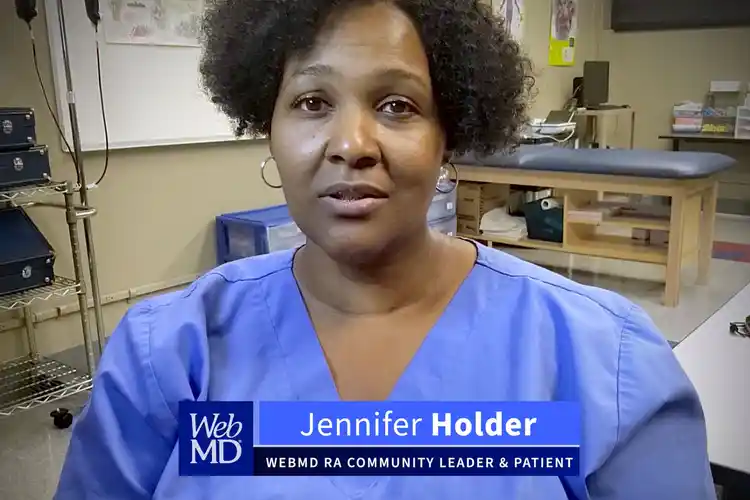Real Talk on RA

Jennifer Holder, community leader of Webmd’s Facebook RA group, got diagnosed with RA before she turned 30, but it wasn’t an easy path. Her concerns were first misdiagnosed as carpal tunnel but she persisted in finding out why her body was still in pain and was correctly diagnosed some five years later. To understand how to manage her symptoms, she first had to understand the disease and the effects it has on her body.
Video Transcript
JENNIFER HOLDER: I was 29 years old when my symptoms started, and I didn’t actually get a diagnosis until maybe about four or five years after that. So my RA presented as carpal tunnel. I had all the symptoms of carpal tunnel. I saw a hand surgeon, and he did all the tests necessary for carpal tunnel. And I had bilateral carpal tunnel releases.
The pain never went away. The numbness and tingling associated with carpal tunnel did. So I went back to the surgeon, and he decided that I should have an MRI. And the MRI is where the RA was first discovered. No one had ever done blood work to check my inflammatory markers. So they just went by the symptoms of carpal tunnel until finally the pain never went away after the surgery, and he did a little further study.
Early on, I didn’t know how to manage it. I hadn’t any real knowledge of what RA was. I guess like everybody else, I just assumed it was another form of arthritis. Most people think arthritis is associated with older people. So of course, my first reaction was, rheumatoid arthritis? But I’m too young for that.
So it’s a little less scary because I have more knowledge, and I’ve learned how to manage it. Not enough people understand the health issues they’re going through. They may get a small couple of sentences from a doctor explaining, but a lot of people don’t really thoroughly understand the RA that they have. They’re told, OK, you have RA, but they don’t really understand what that means.
I think when you understand what RA is, and where it comes from, and the effect it has on your body, and you do your own research, you start to know the questions to ask. You understand what’s happening to your body. And I don’t think that a lot of people dig deep enough on their own to really understand what it is their body is going through and why they feel the way that they do.
So I would say, number one, do your research. Understand what RA is. I know we don’t often want to read scientific stuff because a lot of people feel like that’s just not them, but you want to know about what’s happening to you. And if RA is what’s happening to you, you want to understand thoroughly what that is.
So you know the proper questions to ask. You know why a doctor is telling you to do X, Y, and Z. So number one thing I would tell people is to read. Read about RA.



